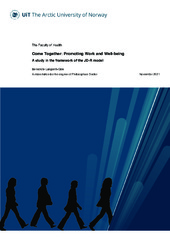| dc.contributor.advisor | Vittersø, Joar | |
| dc.contributor.author | Langseth-Eide, Benedicte | |
| dc.date.accessioned | 2022-02-04T07:45:59Z | |
| dc.date.available | 2022-02-04T07:45:59Z | |
| dc.date.issued | 2022-03-18 | |
| dc.description.abstract | The levels of sickness absenteeism in Norway are extraordinarily high. One of three employees reports that work is partly or fully the reason why they are absent. Regardless of a clear and explicit political goal to reduce sickness absence, previous reforms in Norway have not had much success.
In this dissertation, we collected self-report data from thousands of jobholders and performed cross-sectional and longitudinal studies. The results identified factors that can contribute to the improvement and enhancement of employee well-being and health. In Paper I, we showed that job resources and job demands were associated with work engagement and workaholism, respectively. Both engaged employees and workaholics worked extra hours. Work engagement was positively related to work-related health, whilst workaholism was negatively related to work-related health. In Paper II we revealed that job resources predict work engagement, that work engagement leads to reduced sickness absenteeism, and that this relationship is mediated by health. In Paper III we found that organizational contexts (i.e., nature of work and occupation) and individual dispositions (i.e., positive trait emotions) influence the degree to which individuals appraise job demands positively and negatively.
The theoretical foundation guiding this dissertation is the Job Demands-Resources (JD-R) model, which we refined based on the present research. Specifically, we argue that workaholism could be included in the health-impairment process and that health-related indicators could be included as possible outcomes of the motivational process. Further, we suggest that job demands may play a role in the motivational process and that a more nuanced approach to measuring job demands should be applied in future research.
The findings presented in this dissertation challenge the policies and reforms currently applied to reduce sickness absenteeism in Norway. Today, attention is focused on removing or reducing aspects of work that may cause ill-being, which is important but not sufficient. Rather, our research suggests that the promotion of positive working conditions may lead to hard-working and healthy employees. This can prove profitable for organizations, add societal value through a healthy workforce, and contribute to solve parts of the absence puzzle. Authorities and employers are encouraged to utilize this perspective in the future. | en_US |
| dc.description.doctoraltype | dr.philos. | en_US |
| dc.description.popularabstract | Sickness absenteeism in Norway is extraordinarily high. One of three employees reports that work is partly or fully the reason they are absent. To better understand why, we collected self-report data from thousands of jobholders, and we also followed some of them over time. The results showed that a positive working environment is associated with work engagement, positive work-related health, and reduced absenteeism. These findings challenge the policies and reforms currently applied to reduce sickness absenteeism in Norway. Today, attention is focused on removing aspects of work that may cause ill-being. But this is not enough. Rather, our research suggests that the promotion of positive working conditions may lead to hard-working and healthy employees. This can prove profitable for organizations, add societal value through a healthy workforce, and contribute to solve parts of the absence-puzzle. Authorities and employers are encouraged to utilize this perspective in the future. | en_US |
| dc.description.sponsorship | This dissertation was funded by Northern Norway Regional Health Authority (grant number HST1186-14). | en_US |
| dc.identifier.uri | https://hdl.handle.net/10037/23916 | |
| dc.language.iso | eng | en_US |
| dc.publisher | UiT The Arctic University of Norway | en_US |
| dc.publisher | UiT Norges arktiske universitet | en_US |
| dc.relation.haspart | <p>Paper I: Langseth-Eide, B. (2019). It’s Been a Hard Day’s Night and I’ve Been Working Like a Dog: Workaholism and Work Engagement in the JD-R Model. <i>Frontiers in Psychology, 10</i>, 1444. Also available in Munin at <a href=https://hdl.handle.net/10037/15801>https://hdl.handle.net/10037/15801</a>.
<p>Paper II: Langseth-Eide, B. & Vittersø, J. (2021). Ticket To Ride: A Longitudinal Journey to Work Engagement and Health in the JD-R model. <i>International Journal of Environmental Research and Public Health, 18</i>(8), 4327. Also available in Munin at <a href=https://hdl.handle.net/10037/21657>https://hdl.handle.net/10037/21657</a>.
<p>Paper III: Langseth-Eide, B & Vittersø, J. (2021). Here, there, and everywhere: Applying vignettes to investigate appraisals of job demands. <i>Sustainability, 13</i>(21), 11662. Also available in Munin at <a href=https://hdl.handle.net/10037/23117>https://hdl.handle.net/10037/23117</a>. | en_US |
| dc.rights.accessRights | openAccess | en_US |
| dc.rights.holder | Copyright 2022 The Author(s) | |
| dc.rights.uri | https://creativecommons.org/licenses/by-nc-sa/4.0 | en_US |
| dc.rights | Attribution-NonCommercial-ShareAlike 4.0 International (CC BY-NC-SA 4.0) | en_US |
| dc.subject | VDP::Social science: 200::Psychology: 260::Organizational psychology: 268 | en_US |
| dc.subject | VDP::Samfunnsvitenskap: 200::Psykologi: 260::Organisasjonspsykologi: 268 | en_US |
| dc.title | Come Together: Promoting Work and Well-Being. A study in the framework of the JD-R model | en_US |
| dc.type | Doctoral thesis | en_US |
| dc.type | Doktorgradsavhandling | en_US |


 English
English norsk
norsk
